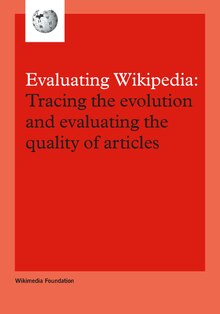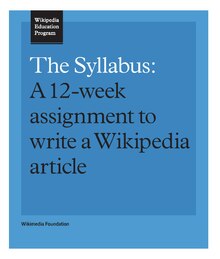Умный регион/Направления/Образование/Шаги/en
(перенаправлено с «Умный регион/Шаги/Образование/en»)
| Languages: | русский · English |
|---|
| Main page | About | Strategy | Dimensions | Wiki-Lists | Regions | Ethnicities | Multilingualism | Stats |

Step-by-step guide on using Wikimedia projects' offered opportunities for Education purposes.
Links below currently lead to either respective section of the document, other pages of Smart region/Education or respective help pages of the English-language version of Wikipedia.
Identify the readiness of the teacher and the students to using Wiki in educational project
[править]- Availability of PCs with full-sized keyboard and mouse manipulator for all participants
- Basic teacher and student competencies for effective onwiki participation are either present or time is budgeted to develop them.
- Teacher's decision on Wiki-compatible kinds of educational activities and specific tasks to enhance student's discipline-specific knowledge development per established curriculum
Identify Wiki-compatible kinds of educational activities
[править]- Individual work
- Group project on material development / description
- Combined methods - with or without teacher participation.
Identify Wiki-compatible types of educational tasks
[править]
- Translation of existing material between languages (Tool-specific help).
- Weaving existing content into the wiki-web of knowledge through studying topics, checking if context-related topical information is mentioned in respective paragraphs, adding what's missing and linking it
- Collecting, summarizing and creating material on selected topic (instead of term papers)
- Critical reading, group discussion and introducing changes: comparing existing material on Wiki with other available sources, analysing argumentation, assessing reliability of referenced sources, adding or correcting disputable content.
Identify types of assessment mechanisms
[править]- Public nature of materials onwiki serves as a unorganized control and assessment by Wiki-community (Talk page comments, Page history, possible feedback on social media)
- Competitive spirit among classmates and wider peers
- Mutual review by project participants, as well as requesting peer review by unrelated representatives of Wiki-community
- Presenting the work in class, at school, district, city, regional or other conferences
- Global statistical data - number and intensity of Pageviews, other data, translation of the content into other languages, etc.
Identify Wiki-spaces to be used
[править]- Thematic Wikimedia projects: Wikidata, Wikipedia, Wikibooks, etc.
- Wikibooks-based multilingual Wikijunior
- Other Wikis for children - multilingual Vikidia (for 8-13 year olds) or predominantly monolingual Russian Letopisi, German Klexicon (6-12 year olds), Dutch WikiKids etc.
Initiate onwiki project page
[править]
- Create an onwiki page for your course, in-class or independent study project to be done by your students (example (англ.))
- Make sure it has a course program (example)
- Place for participant Username registration (example (Tatar))
- List of topics or pages they are to be working on (example (Russian))
- Links to methodological guidelines for independent study by participating students (example (Russian))
- Project participant badge for identifying student Userpage (example (Tatar))
- Section to mark neutral Wiki-ambassadors for students to contact them should they feel the need for mediation in the process of reaching consensus on wording (if the topic will be simultaneously worked on by more than one participant of the Wiki-space)
- Create a dashboard to simplify monitoring your course participants' Wiki-contribution (if interested, example)
See also
[править]- General recommendations regarding Education related dimension of the project
- List of competencies necessary for systemic use of Wikimedia projects in Education


